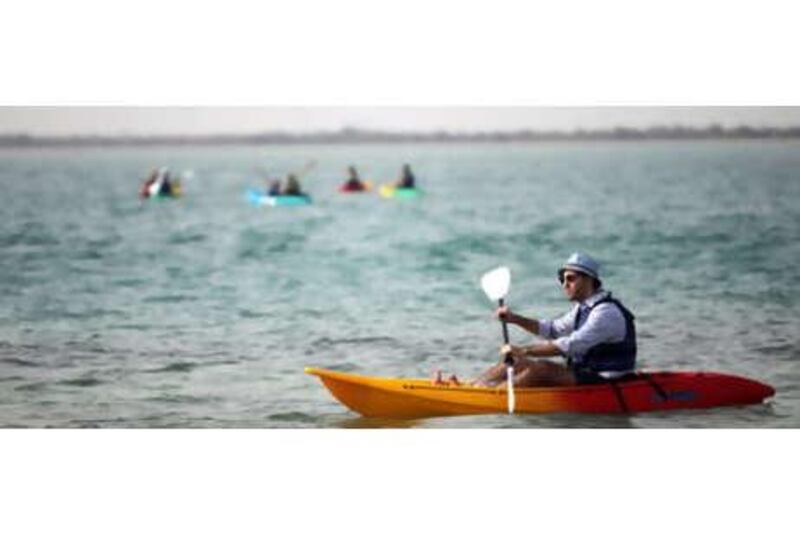Paddling a business through the urban wilds of Abu Dhabi. When calls come in to Don Revis's mobile phone these days, chances are good he'll answer from the seat of his kayak, bobbing in the light surf among the islands north-east of Abu Dhabi. Likewise, whenever Revis goes out paddling - as he does for several hours on most days - odds are he'll spend a good chunk of his time fielding phone calls. Six months ago, Revis started offering small group tours of Abu Dhabi's islands and mangroves by kayak. Clients trickled in by word of mouth at first, but soon business escalated at breakneck speed. Lately, Revis says, he fields about 100 phone inquiries a day - a deluge that has turned his one-man watercraft into a brisk booking office. During one particularly busy day in March, Revis went out on a four-hour tour and forgot his phone. When he came back, he had 123 missed calls.
During the summer doldrums, Revis hopes to expand the operation enough to keep pace with demand next year. Called the Noukhada Adventure Company, the business is owned by an Emirati banker named Ali al Ketbi, and Revis is one of two general managers. By next September, he hopes to have more guides, an office staff and online booking. But until then, his office is wherever he is - often a tiny, rocking boat.
Revis is a tanned North Carolinian with close-cropped black hair, a dark mat of stubble on his face and the wiry frame of a wrestler. The son of missionaries, he grew up in the mountains of Asheville and on the shorelines of Haiti. Until he and his wife, a diplomat, moved to the Emirates four years ago with their small son, they all lived together on a sailboat. "It's a little too synthetic here for me," he said one recent day in Abu Dhabi. "If I hadn't had sailing or something to do on the water, I'd be gone. I'd have been gone two years ago."
This Monday at four in the afternoon, Revis drove to meet a tour group at the Carrefour Hypermarket on Airport Road, towing a trailer (one he'd welded and rigged together himself) that carried nine kayaks behind his dusty Isuzu 4 x 4. Then he led the little caravan - which included a car full of young Canadian tourists and a British expat family with two kids - to a dirt utility access road off Salam Street near the southeastern end of Abu Dhabi.
The narrow raised road followed under a row of high-voltage power lines leading out across a tidal basin to the east. Revis eventually turned left onto a gravel footing underneath one of the huge electrical pylons, a flat, squared-off surface large enough to accommodate several parked cars. A small beach - Revis's boat launch - sat between some bushes about 50 metres away from the pylon's massive steel legs.
As the group carried their brightly-coloured kayaks to the water, a lone Indian labourer picking up trash in an orange jumpsuit walked up and stared at the scene. In the near distance, the giant holding tanks and smokestacks of an oil refinery loomed. Dominating the horizon to the north were the soaring, unfinished towers of Reem Island, capped off by silhouetted cranes. In between was a serene expanse of clear aquamarine water, sandy islands and green mangroves.
Out on the water, Revis pointed out the landmarks of Abu Dhabi's northward expansion. "The power lines to your right, if you look over that way, that's Saadiyat Island," he said. "That's the Eastern mangroves there," he said, pointing to a line of green on his left, butting right up against Abu Dhabi island. "That's where we had been doing most of our eco-tours. As of about three weeks ago, we started finding a bunch of dead fish," he said. "Now the water smells so bad, I can't even take anybody through there."
"They're supposed to be doing something about it. The problem is, the channel's blocked," he said. "Construction." Revis was wearing an old red T-shirt, camouflage swim trunks and a tattered safari hat as he paddled, and he spoke in a Southern, slightly military, earnestly motivational voice. "My thing is the three E's: Education, Environment and Emiratisation," he said. "A couple weeks ago, I had a class from a university here - 10 girls. All of them were in full abayas in the boats."
After a brief stop to swim off a tiny island, Revis led the day's little group into a network of mangroves about three kilometers off the coast of Abu Dhabi (the nearest feasible access to the saltwater forests, given the state of the Eastern mangroves). "They estimate about 70 percent of all the fish in the Gulf are born in these estuaries," Revis explained to the group. "It's a huge nursery." Inside the labyrinth of narrow milky channels and exposed roots, all was quiet except for bird sounds, oar splashes and a dull whirr - like the noise of a blow-dryer in the next room. "That's the dredging works," said Revis's partner Mark Freeman. Deep channels were being dug in the Gulf's floor nearby.
On the paddle home, the sinking sun was a perfect white pearl in the haze, and Abu Dhabi's skyline flattened into a murky silhouette. Scanning the city from left to right was like reading a graph: rising from zero in the sparse south-east, posting consistent but modest returns in the middle of the main island, and then shooting into jagged peaks and valleys in the north and west, culminating with the monumental, uninhabited towers on Reem Island - which hovered nearby over the tiny, bobbing group of paddlers.
* John Gravois





